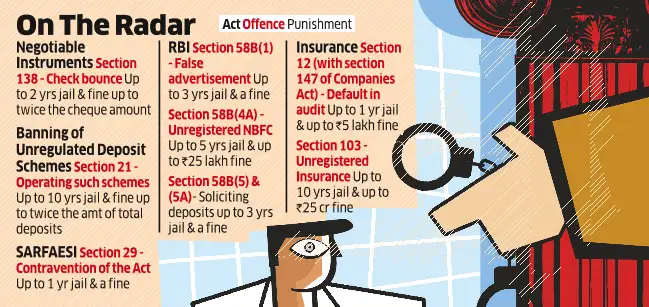New Delhi: The government is looking to reclassify several offences under financial sector laws, including the bouncing of cheques, as civil offences rather than criminal ones to improve the ease of doing business and unclog the courts. These will then be punishable only by monetary penalties, not jail time.
The Department of Financial Services has sought public comments on decriminalising 39 sections in 19 acts under its administrative purview including the Banking Regulation Act, the Reserve Bank of India (RBI) Act, the Insurance Act and the Negotiable
“Criminalising procedural lapses and minor non-compliances increases burden on businesses and it is essential that one should re-look at provisions which are merely procedural in nature and do not impact national security or public interest at large,” the DFS said in the statement of reasons explaining the rationale behind the proposed move.

Currently, bounced cheques can lead to imprisonment of up to two years and a fine of up to twice the value of the cheque or both under the Negotiable Instruments Act. Taking public deposits in violation of Section 3 of the Banning of Unregulated Deposit Schemes Act as well as under some sections of the RBI Act is also sought to be decriminalised. The government is seeking to decriminalise four sections under the RBI Act in this regard.
The government has said that the ensuing uncertainty in legal processes and the time taken for resolution in the courts hurts ease of doing business. It said criminal penalties, including imprisonment for minor offences, act as deterrents but are perceived as being among the major reasons impacting business sentiment and hindering investment both from domestic and foreign investors, seen as critical in the wake of the Covid-19 outbreak. Improving ease of doing business has been one of the Centre s prime aspirations.
Finance minister Nirmala Sitharaman had announced the government’s intent to decriminalise several laws in her February budget speech and steps have been taken to re-categorise several offences as civil.
The principles that will inform the process of reclassification are that it should decrease the burden on businesses and inspire confidence among investors besides focusing on economic growth, while upholding the public interest and safeguarding national security. The nature of non-compliance will need to be evaluated to differentiate between inadvertent omission and the habitual nature of compliance. Stakeholders have been asked to submit their views by June 23.
Experts say the government should raise monetary penalties to deter offences.
“The focus should not just be on decriminalisation, the fine amount should be increased to deter such offences,” said Pavan Vijay of Corporate Professionals. “The law needs to differentiate between going after the management and recovering dues from them versus going after the business”
Source : Economic Times
